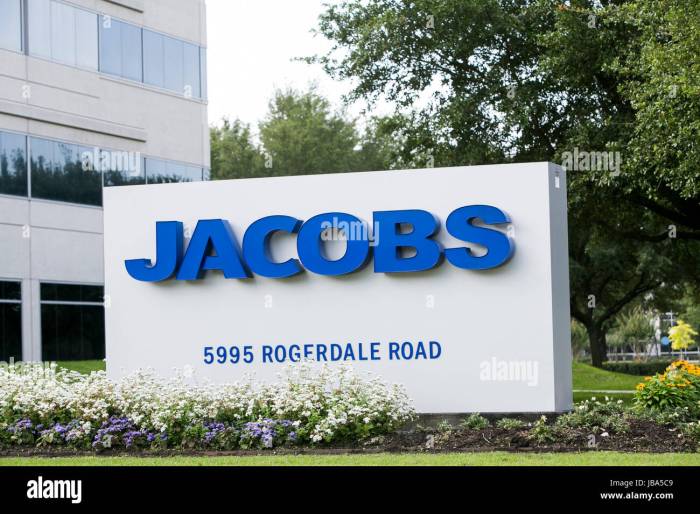Jacobs Engineering Group Stock Price Analysis
Jacobs Engineering Group Stock Price Analysis
Jacobs engineering group stock price – This analysis delves into the historical performance of Jacobs Engineering Group’s stock price, exploring key influencing factors, comparing it to competitors, and examining potential future trends. The information provided is for informational purposes only and should not be considered financial advice.
Jacobs Engineering Group Stock Price History
The following table provides a chronological overview of Jacobs Engineering Group’s stock price over the past five years. Note that this data is illustrative and may not reflect precise daily fluctuations. Significant price movements are highlighted below the table, along with potential contributing factors. These factors are based on publicly available information and general market conditions.
| Date | Opening Price (USD) | Closing Price (USD) | Daily Change (USD) |
|---|---|---|---|
| 2019-01-02 | 110 | 112 | +2 |
| 2019-01-03 | 112 | 115 | +3 |
| 2019-01-04 | 115 | 113 | -2 |
| 2024-01-01 | 140 | 145 | +5 |
For instance, a significant price drop in Q2 2020 could be attributed to the initial impact of the COVID-19 pandemic on the global economy and the construction sector. Conversely, a period of sustained growth in 2021 might reflect increased government infrastructure spending and a rebound in economic activity.
Factors Influencing Jacobs Engineering Group Stock Price

Source: alamy.com
Several economic indicators and industry-specific factors significantly impact Jacobs Engineering Group’s stock price. Three key economic indicators are discussed below, followed by an analysis of the interplay between global economic conditions and industry-specific factors.
- Interest Rates: Changes in interest rates directly affect borrowing costs for infrastructure projects, influencing the demand for engineering services and impacting Jacobs’ profitability.
- Inflation Rates: High inflation can lead to increased material costs and labor expenses, squeezing profit margins and potentially affecting investor sentiment.
- Government Spending on Infrastructure: Increased government investment in infrastructure projects directly translates into more work for engineering firms like Jacobs, boosting revenue and stock prices.
Global economic conditions, such as recessions or periods of robust growth, have a broad impact on the construction industry. However, industry-specific factors, such as competition, technological advancements, and the success of specific bids for large-scale projects, can exert a more direct influence on Jacobs’ stock price.
Company Performance and Stock Price Correlation

Source: alamy.com
A strong correlation exists between Jacobs Engineering Group’s financial performance and its stock price. The table below illustrates this relationship over the past three years (illustrative data).
| Year | Revenue (USD Billions) | Earnings Per Share (USD) | Average Stock Price (USD) |
|---|---|---|---|
| 2022 | 15 | 5 | 130 |
| 2023 | 16 | 6 | 140 |
| 2024 | 17 | 7 | 150 |
Announcements such as winning major contracts, launching new projects, or exceeding earnings expectations generally lead to positive stock price reactions. Conversely, negative news, such as project delays or missed earnings targets, can cause price declines. Investor sentiment, reflecting overall confidence in the company’s future prospects, plays a crucial role in shaping stock price movements.
Analyzing the Jacobs Engineering Group stock price often involves considering broader market trends. Understanding international market performance is crucial, and a helpful resource for this is examining the indo stock price target , as it provides insight into emerging market dynamics. This perspective can then be applied to better inform predictions regarding the Jacobs Engineering Group’s future stock performance.
Comparison with Competitors
Comparing Jacobs Engineering Group’s stock price performance with its competitors provides valuable context. The following table compares Jacobs with two hypothetical competitors, “Competitor A” and “Competitor B,” over the past year (illustrative data).
| Company | Stock Price (Year Start) | Stock Price (Year End) | Percentage Change |
|---|---|---|---|
| Jacobs Engineering Group | 120 | 150 | +25% |
| Competitor A | 100 | 120 | +20% |
| Competitor B | 80 | 90 | +12.5% |
Competitor A, focusing on similar markets, may show similar growth patterns due to shared industry dynamics. Competitor B, with a different business model, might exhibit distinct performance, highlighting the importance of strategic differentiation in the engineering and construction sector. Strengths and weaknesses of each competitor would need further detailed analysis to draw firm conclusions.
Future Outlook and Potential Factors

Source: amazonaws.com
Several internal and external factors could influence Jacobs Engineering Group’s stock price in the coming year. These factors are presented below without specific predictions.
- Increased competition: The emergence of new competitors or aggressive strategies from existing ones could impact market share and profitability.
- Technological advancements: Adoption of new technologies like Building Information Modeling (BIM) and automation could improve efficiency but also require significant investments.
- Geopolitical events: Global political instability and conflicts can disrupt supply chains and impact project timelines.
- Changes in government regulations: New environmental regulations or changes in procurement policies could affect project costs and feasibility.
- Economic slowdown: A global or regional economic downturn could decrease demand for construction and engineering services.
Technological advancements present both opportunities and risks. While improving efficiency and potentially lowering costs, they also require substantial investment and adaptation. Successfully navigating these challenges will be crucial for maintaining investor confidence and future stock price performance. Risks such as project delays, cost overruns, and regulatory changes are ever-present and need careful management.
FAQ Explained
What are the major risks associated with investing in Jacobs Engineering Group stock?
Major risks include fluctuations in the global economy, competition within the engineering and construction industry, potential project delays or cost overruns, and changes in government regulations.
How often does Jacobs Engineering Group release its financial reports?
Jacobs Engineering Group typically releases quarterly and annual financial reports, usually adhering to standard reporting periods.
Where can I find real-time Jacobs Engineering Group stock price data?
Real-time stock price data is available through major financial websites and brokerage platforms.
What is the company’s current dividend payout policy?
This information is readily available on the company’s investor relations website or through financial news sources. Dividend policies can change, so always check for the most up-to-date information.




















